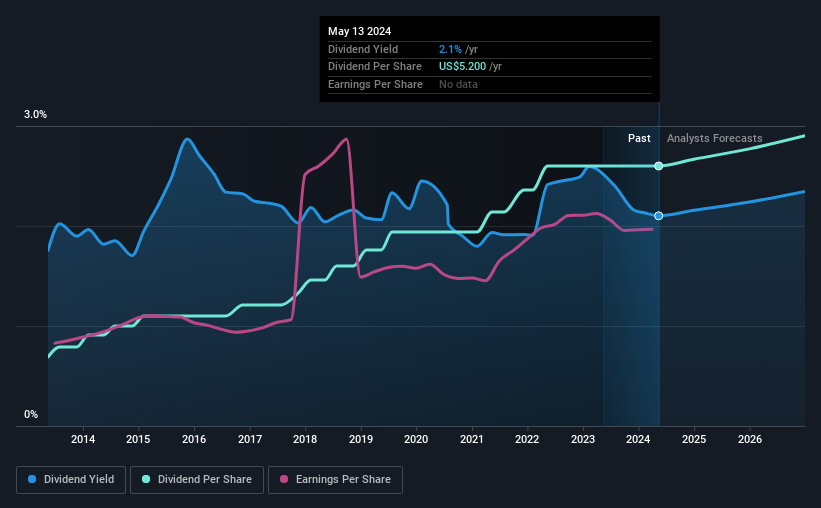Union Pacific (NYSE:UNP) Is Paying Out A Dividend Of $1.30
Union Pacific Corporation (NYSE:UNP) has announced that it will pay a dividend of $1.30 per share on the 28th of June. This makes the dividend yield 2.1%, which will augment investor returns quite nicely.
See our latest analysis for Union Pacific
Union Pacific's Payment Has Solid Earnings Coverage
If the payments aren't sustainable, a high yield for a few years won't matter that much. Based on the last payment, Union Pacific was quite comfortably earning enough to cover the dividend. This means that a large portion of its earnings are being retained to grow the business.
Looking forward, earnings per share is forecast to rise by 37.4% over the next year. If the dividend continues along recent trends, we estimate the payout ratio will be 40%, which is in the range that makes us comfortable with the sustainability of the dividend.
Union Pacific Has A Solid Track Record
The company has a sustained record of paying dividends with very little fluctuation. The dividend has gone from an annual total of $1.38 in 2014 to the most recent total annual payment of $5.20. This implies that the company grew its distributions at a yearly rate of about 14% over that duration. So, dividends have been growing pretty quickly, and even more impressively, they haven't experienced any notable falls during this period.
Dividend Growth May Be Hard To Achieve
Some investors will be chomping at the bit to buy some of the company's stock based on its dividend history. However, Union Pacific has only grown its earnings per share at 5.0% per annum over the past five years. Growth of 5.0% may indicate that the company has limited investment opportunity so it is returning its earnings to shareholders instead. This isn't necessarily bad, but we wouldn't expect rapid dividend growth in the future.
We Really Like Union Pacific's Dividend
Overall, we think that this is a great income investment, and we think that maintaining the dividend this year may have been a conservative choice. Distributions are quite easily covered by earnings, which are also being converted to cash flows. Taking this all into consideration, this looks like it could be a good dividend opportunity.
It's important to note that companies having a consistent dividend policy will generate greater investor confidence than those having an erratic one. However, there are other things to consider for investors when analysing stock performance. For example, we've picked out 1 warning sign for Union Pacific that investors should know about before committing capital to this stock. Looking for more high-yielding dividend ideas? Try our collection of strong dividend payers.
Have feedback on this article? Concerned about the content? Get in touch with us directly. Alternatively, email editorial-team (at) simplywallst.com.
This article by Simply Wall St is general in nature. We provide commentary based on historical data and analyst forecasts only using an unbiased methodology and our articles are not intended to be financial advice. It does not constitute a recommendation to buy or sell any stock, and does not take account of your objectives, or your financial situation. We aim to bring you long-term focused analysis driven by fundamental data. Note that our analysis may not factor in the latest price-sensitive company announcements or qualitative material. Simply Wall St has no position in any stocks mentioned.

 Yahoo Finance
Yahoo Finance 
